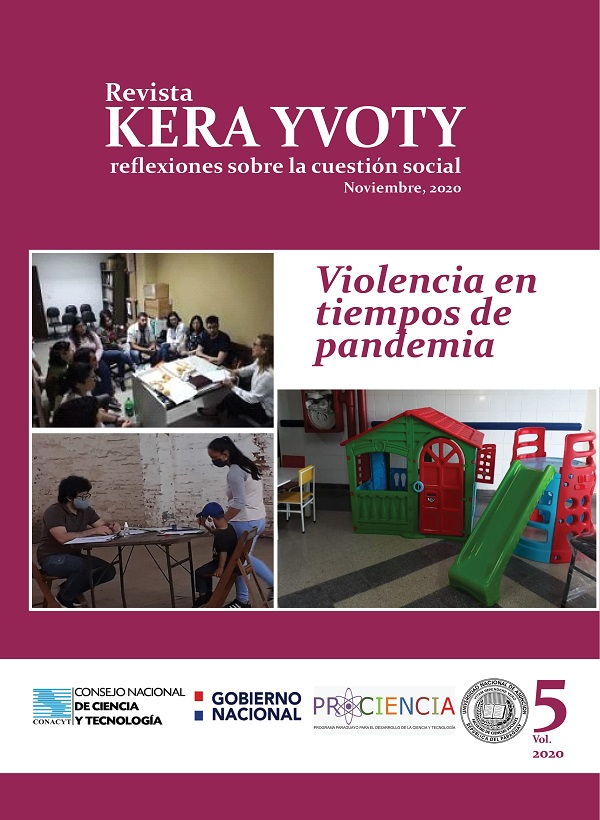Abstract
The effect of uncertainty generated by the health emergency due to the pandemic, with its restrictions imposed by confinement, led the disadvantaged social sectors to fall into situations of extreme vulnerability. The inability of the public power to meet the needs that arose in this scenario, exposed the structure of privileges in Paraguay, resulting from economic concentration and the capture of the State by the dominant social sectors. The fragility of public services, especially social security, to respond to social protection demands is explained especially by their low financing with genuine resources from the public treasury, given a regressive tax system whose design is imposed by the dominant sectors, reflectingthe social structure. The possibility of modifying the characteristics of the latter is by pressing for changes in the tax structure, constituting the main challenge of collective actions.
References
Abente, D. (2012). Estatalidad y calidad de la democracia en Paraguay. América Latina Hoy, 60, pp. 43-66.
Barreix, A. (2016). Experiencias y prácticas internacionales de tributación. BID.
Borda, D., & Caballero, M. (2018). Una reforma tributaria para mejorar la recaudación y la equidad. CADEP.
Borda, D., & Caballero, M. (2017). Desempeño e institucionalidad tributaria en Paraguay. CADEP.
Borda, D., & Caballero, M. (2016). Eficiencia y equidad tributaria. Una tarea en construcción. CADEP.
Dobrée, P. (Ed.). Usos del tiempo y desigualdades en Paraguay. CDE.
Duarte, R. (2017). Capacidades estatales para la lucha contra la pobreza en el Paraguay. (Tesis de Maestría). Inédito.
Elias, N. (2011). El proceso de civilización. Fondo de Cultura Económica.
Dirección General de Estadística, Encuestas y Censos. (2018). Principales resultados de pobreza monetaria y distribución del ingreso EPHC 2018. DGEEC.
Galeano Monti, J. (2017). Territorios de exclusión social. Arandurâ
García, S. (2015). La protección social en Paraguay: conexiones históricas para entender el presente. Revista de Investigación en Ciencias Sociales, 2(3).
Masi, F. (2018). Consideraciones sobre la contribución impositiva. En M. Rivarola (Ed.), Fiscalidad para la Equidad social. Decidamos/CADEP.
Marx, K. (1959). El capital. Crítica de la economía política. Fondo de Cultura Económica.
Ortiz, L. (2016). Desigualdad y clases sociales. Estudios sobre la estructura social paraguaya. CEADUC/CLACSO/ICSO.
Palau, M. (2016). La clase: más que estructura, una relación de explotación. En L. Ortiz (Ed.), Desigualdad y clases sociales. Estudios sobre la estructura social paraguaya. CEADUC/CLACSO/ICSO.
Piketty, T. (2019). Capital e ideología. Deusto.
Rodríguez José C. (2019). Fiscalidad y extractivismo en Paraguay. Propuesta de cambio tributario para el desarrollo, la inclusión, la equidad y la prosperidad. FES.
Schuster, C. (2013). Clientelismo y el juego político de profesionalización del empleo público en Paraguay.CADEP.
Serafini, V, Imas, V., Riera, F., & Montalto, B. (2019). La protección social en el Paraguay. Objetivos de Desarrollo Sostenible 2030. CADEP.
Serafini, V. (2017). Elites y captura del Estado. Paraguay: un estudio exploratorio. Decidamos.
Weber, M. (1964). Economía y Sociedad. Fondo de Cultura Económica.
Zavattiero, C. Fantin, A., Zavattiero Tornatore, G. (2019). Demandas potenciales en salud y cuidados desde los cambios en la dinámica demográfica en Paraguay. ICSO.

This work is licensed under a Creative Commons Attribution 4.0 International License.
Copyright (c) 2020 Luis Ortiz




